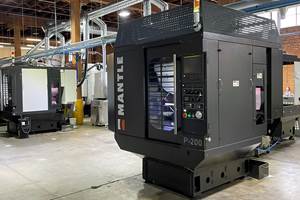Not Every Successful Career Starts with a College Degree
βItβs time to redefine the definition of success.β That was a key point made by CNC Software President Meghan West, who was the keynote speaker at University of South Florida College of Educationβs luncheon in Tampa. She explained why specialized training in manufacturing skills may be better career preparation for smart students with a talent for making things.
Share






Meghan West made this wooden reindeer as Girl Scout craft project 25 years ago. At the time, she learned a key lesson about manufacturing—it’s a process by which raw materials become desirable objects of value.
Meghan West, president of CNC Software Inc., developers of Mastercam CAD/CAM software, recently addressed a group of educators and community leaders from across the Tampa Bay area about the compelling need for and benefits of careers in manufacturing. The University of South Florida’s College of Education and the Florida State Fairgrounds hosted the event, the 14th annual Education in Action Luncheon. A diverse group of 300 education stakeholders attended, including teachers, administrators, executives and student leaders.
After apprising the group about the misperceptions of manufacturing, the current skills gap in manufacturing, and the impact that manufacturing has on our everyday lives, Ms. West gave voice to one of the core issues surrounding the lack of interest and knowledge about manufacturing among children and adolescents: “It’s time to redefine the definition of success,” she said. “The default advice, often incentivized, given to kids in middle school and high school is ‘go to college.’ While that’s excellent guidance for some, the traditional four-year-college track is clearly not the best choice for many students. There’s a group of kids out there who are brilliant with their hands and minds, who like to make things, who can fix things. Industry is clamoring for this group. In some cases, with just a year of specialized training, those kids can get very-good-paying jobs immediately and embark on a career path that offers satisfying financial and personal rewards. Isn’t that success, too?”
Supporting the opportunities that Ms. West outlined, she provided the following statistics:
- 48 percent of large manufacturers plan to return production to the United States from offshore.
- Manufacturing costs in the United States are now only 5 percent higher than in China.
- About 66,800 new manufacturing jobs are predicted every year through 2019.
- The average annual earnings for jobs in manufacturing is $77,506, whereas the average annual earnings for all industries is $62,546.
She also reminded the audience that, even for kids who do take the four-year college track, manufacturing companies offer interesting and engaging opportunities for many degreed specialists. For example, in addition to shopfloor personnel, manufacturers employ accountants; marketing, sales and human resource professionals; engineers; and product designers.
“At some point in our lives, manufacturing is new to all of us,” Ms. West said. “Please start enlightening children—girls and boys—that if something isn’t grown or mined from the earth, it’s made by people who know how to use tools and some very cool machines, computers and software. Make it relatable to the car, the fork, the toy. Often, too, the light goes on with just one project made by them.”
In Ms. West’s case, the light went on when she made a wooden gift to earn a Brownies Girl Scout badge about 25 years ago. Ms. West reached under the podium and held up the actual project: a one-inch-thick wooden reindeer adorned with jingling bells and facial decorations. She said her father, one of the founding developers of Mastercam software, helped her program and run the machine that cut out the reindeer form. “And the rest is history,” she said.
Ms. West challenged the group of educators to consider project-based learning as a way to make school more interesting and provided examples of several from Mastercam’s customers. She relayed relevant commentary about that point from Megan Smith, Chief Technology Officer of the United States. Quoting Ms. Smith’s statement, she said: “We have wonderful, wonderful teachers who can’t disrupt their industry because it’s so constrained and bureaucratic. We need to make school way less boring. Instead, a great way to learn is project-based learning. One of the most important things we need to do in the United States is to empower kids to be makers rather than consumers. Project-based learning is more effective and less expensive. All the kids need to be able to do that. The world becomes the classroom, instruction comes from the topics as you need it, and people collaborate on real stuff.”
Ms. West concluded her keynote with the following question to the group: “What can you do to excite the youth of our country about manufacturing?”
Related Content
Workholding Fixtures Save Over 4,500 Hours of Labor Annually
All World Machinery Supply designs each fixture to minimize the number of operations, resulting in reduced handling and idle spindle time.
Read MoreThe Power of Practical Demonstrations and Projects
Practical work has served Bridgerland Technical College both in preparing its current students for manufacturing jobs and in appealing to new generations of potential machinists.
Read MoreIn Moldmaking, Mantle Process Addresses Lead Time and Talent Pool
A new process delivered through what looks like a standard machining center promises to streamline machining of injection mold cores and cavities and even answer the declining availability of toolmakers.
Read MoreShop Tour Video: You've Never Seen a Manufacturing Facility Like This
In the latest installment of our “View From My Shop” series, explore Marathon Precision’s multi-process approach to manufacturing, where blacksmiths and hand-forged dies meet state-of-the-art CNC machining. Discover how restoring classic muscle cars and building custom art projects creates a dynamic shop culture — and draws top talent to this unique and innovative metalworking facility.
Read MoreRead Next
AMRs Are Moving Into Manufacturing: 4 Considerations for Implementation
AMRs can provide a flexible, easy-to-use automation platform so long as manufacturers choose a suitable task and prepare their facilities.
Read MoreMachine Shop MBA
Making Chips and 91±¬ΑΟΝψ are teaming up for a new podcast series called Machine Shop MBA—designed to help manufacturers measure their success against the industry’s best. Through the lens of the 91±¬ΑΟΝψ benchmarking program, the series explores the KPIs that set high-performing shops apart, from machine utilization and first-pass yield to employee engagement and revenue per employee.
Read More





















